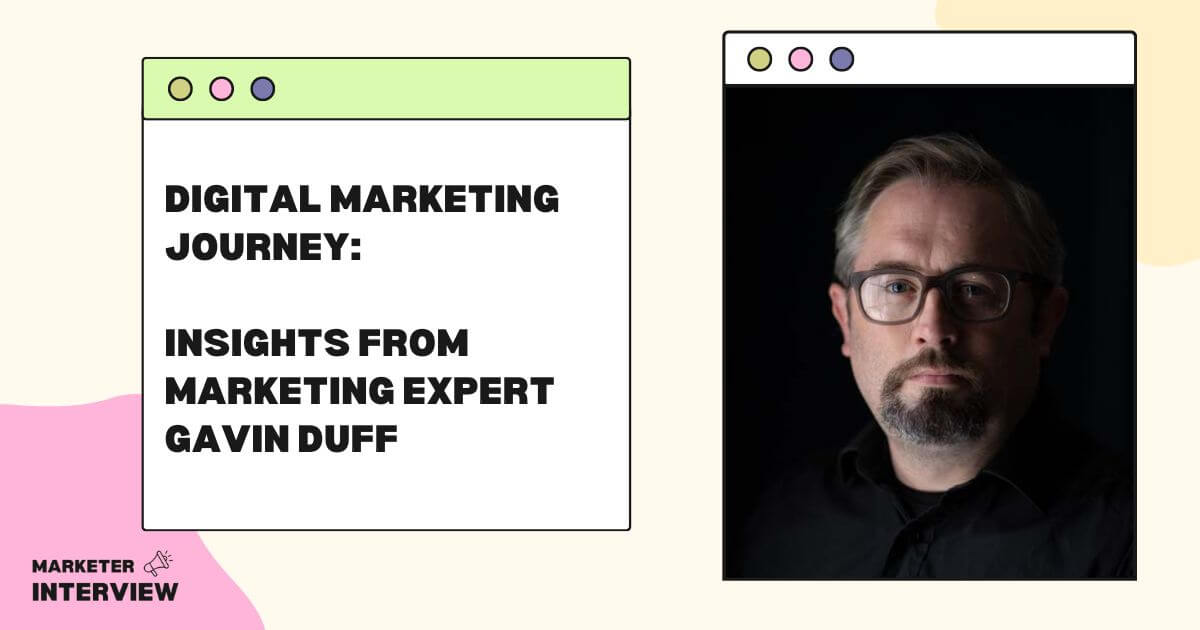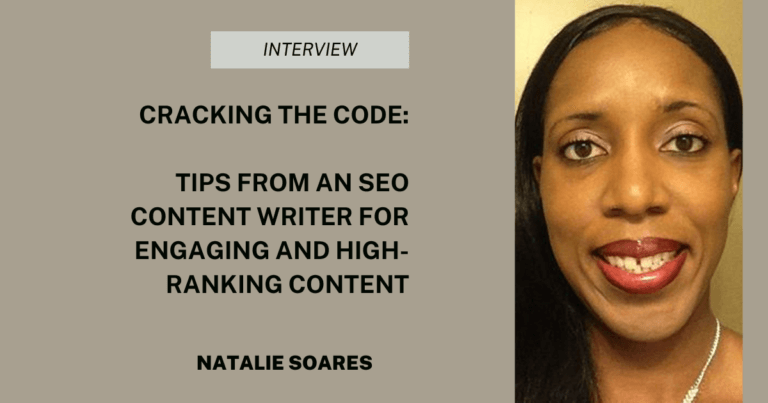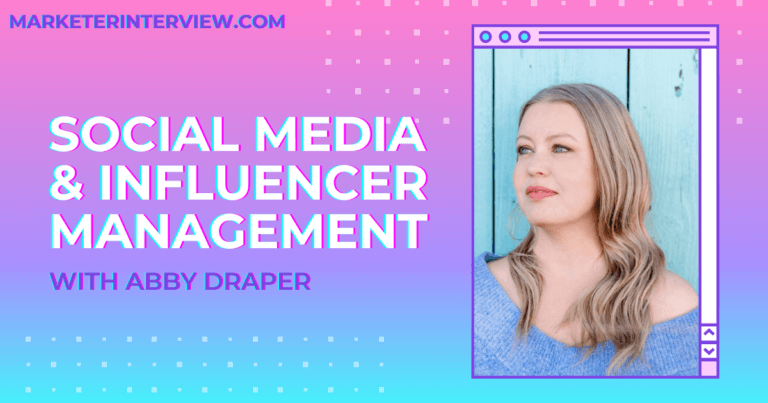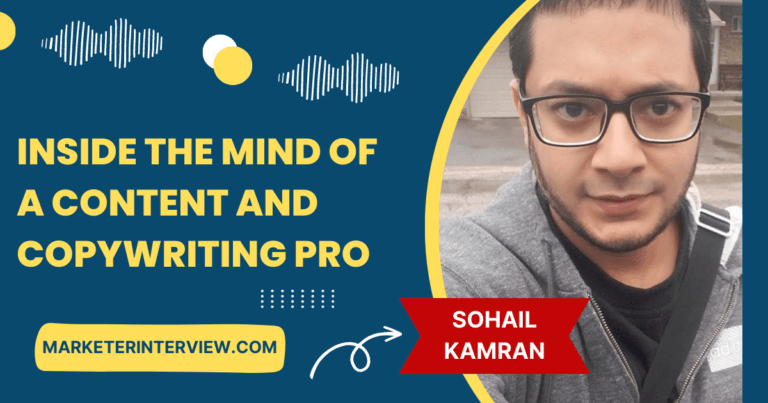Digital Marketing Journey: Insights from Marketing Expert Gavin Duff
Welcome to Marketer Interview, the popular marketing blog where we delve into the minds of exceptional marketers.
In today’s interview, we spoke with Gavin Duff, a highly experienced digital marketing expert passionate about SEO, content, AI, and cyberpsychology.
With over 20 years of hands-on experience in digital strategy, search marketing, analytics, content strategy, social media, and e-commerce, Gavin has significantly impacted various sectors.
His impressive client list includes prominent names such as Amazon, Ford, Hilton Hotels, Dominos Pizza, Aer Lingus, among many others. He is currently Head of Digital at Friday.
Gavin is also a known conference speaker, lecturer for many institutions including Trinity College Dublin, podcast guest, media source, guest blogger, and many other things in digital marketing. He also holds a Dip. in Cyberpsychology.
Gavin’s expertise extends beyond marketing, delving into AI, neuromarketing, and cyberpsychology, exploring the intricate relationship between humans, technology, and advertising.
Contents
- 1 Can you share your journey and how you got started in digital marketing? What inspired you to pursue a career in this field?
- 2 Throughout your 20 years of experience, what are some of the most significant changes you’ve witnessed in the digital marketing landscape?
- 3 As the Head of Digital, you’ve worked with diverse clients and sectors. Could you highlight a specific project or campaign that you found particularly challenging or rewarding?
- 4 With the ever-evolving world of SEO, what essential tactics or best practices do you recommend to stay ahead of the curve and maintain a competitive edge?
- 5 Content marketing has become increasingly crucial in recent years. From your perspective, what key elements make content genuinely engaging and effective?
- 6 AI (Artificial Intelligence) has made significant advancements in the marketing industry. In what ways will marketers need to leverage AI technologies to enhance marketing campaigns or optimize performance?
- 7 Cyberpsychology is a fascinating area of interest for you. How do you approach understanding the psychological aspects of consumer behavior in the digital realm?
- 8 In your experience, what role does data analytics play in shaping marketing strategies? Can you share a case where data-driven insights significantly impacted a campaign’s success?
- 9 As a seasoned professional, you must have encountered various tools and software. Which ones have proven to be indispensable for your work?
- 10 Considering the rapid pace of technological advancements, what future trends in digital marketing do you find most exciting or promising?
I began my digital career at Yahoo, which seems quite strange given its lack of relevance nowadays.
While there, I found that I had a natural talent for search marketing, which led me to pursue roles primarily on the agency side.
Initially, my focus was mainly on search marketing. Still, as I continued developing my skills, I became eager to expand my expertise in display, social media, content, and broader digital strategy direction.
I was determined not to be perceived as a mere “jack of all trades,” so I’ve dedicated countless years to personally engaging in each of these disciplines and becoming an expert.
Despite what some people tell you, taking a short course will not make you an expert. In the area of digital marketing, countless individuals claim to be experts. Still, the real differentiating factor lies in the extent of their practical experience and their genuine mastery of these.
Throughout your 20 years of experience, what are some of the most significant changes you’ve witnessed in the digital marketing landscape?
I’ve had the privilege of witnessing several key transformations that left an indelible mark on the industry.
One of the most striking changes has been the rapid evolution of technology, drastically expanding the array of channels and tools available to connect and engage with audiences. The rise of social media platforms, the ubiquitous presence of mobile devices, and the advent of data-driven analytics have revolutionized how we establish connections with consumers.
In response to these shifts, I’ve embraced a more dynamic and adaptive approach to crafting marketing channel strategies. I recognize the importance of staying agile and keeping pace with emerging trends and platforms to seize new opportunities. The significance of personalized and targeted messaging has become paramount in meeting the expectations of customers who now seek tailored experiences across various touchpoints.
Also, the era of abundant data has necessitated a more analytical mindset. I’ve witnessed the paradigm shift towards data-driven decision-making, utilizing advanced analytics and customer insights to optimize campaigns, enhance targeting precision, and generate meaningful results.
This data-centric approach has empowered me to refine strategies based on empirical evidence, unlocking a deeper understanding of our audience. Privacy regulations are beginning to spoil the fun here, but there’s still much to be had.
Another notable change I observed is the ascendancy of content marketing and the democratization of content creation. This has led me to adopt a more holistic and customer-centric perspective. Rather than focusing solely on promotional or SEO-led content, I prioritize delivering valuable, engaging content that resonates with audiences and fosters long-term brand affinity.
Realistically, the digital marketing landscape has undergone significant transformations that have continuously reshaped our operations. I’ve had to learn to adapt to these changes, staying dynamic, data-driven, and customer-centric. I’ve successfully navigated the digital marketing landscape by embracing emerging technologies, harnessing analytics, and emphasizing compelling content.
As the Head of Digital, you’ve worked with diverse clients and sectors. Could you highlight a specific project or campaign that you found particularly challenging or rewarding?
One project that stands out as both challenging and rewarding was the successful transformation of a significant insurance client from a relatively unknown brand to a prominent player in the market, capturing a significant market share.
We devised a comprehensive digital strategy encompassing several key channel strategies to achieve this. Firstly, we conducted in-depth market research and competitive analysis to thoroughly understand the target audience and identify untapped opportunities within the insurance sector. This analysis served as the foundation for our subsequent actions.
Next, we focused on building brand awareness through targeted and highly engaging digital campaigns. We crafted compelling messaging that resonated with the target audience, highlighting the unique value propositions of our client’s insurance offerings.
By leveraging a combination of SEO, social media advertising, and display advertising, we maximized the reach and visibility of our campaigns, ensuring that our client’s brand gained significant exposure.
One crucial aspect of our strategy was establishing trust and credibility in the insurance market. We achieved this by implementing a robust content marketing strategy that positioned our client as a thought leader and reliable source of information within the industry. Difficult to do with what most see as an uninteresting product, but we did it!
We created informative and engaging content, including articles, blog posts, and educational resources that addressed key pain points and provided valuable insights to potential customers. This approach helped us build a loyal and engaged audience, establishing our client as a reputable and trustworthy brand.
Furthermore, we implemented a data-driven approach to optimize our campaigns continuously. We could make data-informed decisions and refine our strategies in real-time by closely monitoring key performance indicators (KPIs), such as customer acquisition costs. This iterative process allowed us to maximize the effectiveness of our campaigns and drive higher returns on investment for our clients.
Lastly, we fostered solid partnerships and collaborations within the insurance industry. By strategically partnering with industry experts and complementary businesses, we expanded our reach and credibility, tapping into their established networks and leveraging their expertise to amplify our client’s brand presence.
This combination resulted in a significant increase in brand awareness and market share.
This project was particularly challenging due to the competitive nature of the insurance industry – one of the most competitive there is – and the need to establish credibility for a relatively new brand. However, the rewards were immense as we successfully positioned our client as a trusted and prominent player in the market, capturing the attention and loyalty of our target audience. It was fun.
With the ever-evolving world of SEO, what essential tactics or best practices do you recommend to stay ahead of the curve and maintain a competitive edge?
Well, there are a couple of tactics that will be essential. One of them is leveraging AI to your advantage.
AI-powered tools and platforms have become increasingly powerful and can make our lives much easier as SEO professionals. They can help with keyword research, content research (but not writing!), and data analysis. By using AI algorithms, we can gain valuable insights into user behavior, identify emerging trends, and make smarter decisions based on data.
To understand the searcher, we need to dig deeper and understand our target audience’s motivations, needs, and preferences. We can gain insights into their pain points, desires, and search habits through thorough audience research. This knowledge helps us create highly targeted content that truly resonates with searchers.
It’s all about being user-centric. We need to create content that targets relevant topics and provides value to the user. It’s about addressing their needs, answering their questions, and providing helpful solutions. We want our content to be engaging, readable, and relevant to the searcher’s intent.
Voice search will also see another increase, but not just yet. Apple Vision Pro and others like it will drive this. With the rise of immersive technology, voice search optimization has become a must.
Lastly, staying ahead of the curve in SEO requires continuous learning and adaptation. The industry is constantly changing, with new trends and algorithm updates emerging.
It’s essential to stay informed by following reputable sources and studying. We can adapt our strategies to keep up with the ever-evolving SEO landscape by embracing continuous learning and experimentation.
Content marketing has become increasingly crucial in recent years. From your perspective, what key elements make content genuinely engaging and effective?
Content marketing has become a crucial aspect in recent years, and critical elements make content genuinely engaging and effective.
To ensure that our content strategy aligns with our clients and, more importantly, user goals, we must move beyond generic, keyword-driven content and focus on delivering valuable, original content that stands out.
One of the issues I have noticed is the overabundance of what is known as “topic cluster content.” Many brands write multiple blog posts about related sub-topics simply to optimize for search engines.
However, this approach often leads to repetitive and uninteresting content. It’s essential to balance writing for SEO and providing valuable content that truly resonates with your target audience.
To create engaging and compelling content, we must adhere to Google’s guidelines and ensure our content serves a purpose. We must also strive to offer unique perspectives and avoid copying ideas already on the internet.
However, what truly sets good content apart is its added value to users. Google emphasizes the importance of effort, expertise, manual curation, and added value for users. This means we should invest time and resources into creating content beyond superficial information and offering genuine insights, practical advice, or thought-provoking ideas. Doing so can elevate our content from being just another piece in the sea of mediocrity.
Having an opinion and a distinctive voice is crucial in making our content stand out. While it might be tempting to conform to what others are saying and try to say it better, bringing fresh perspectives and offering unique insights is far more impactful.
We must be willing to take risks and share our honest opinions, even if they might go against the grain. By doing so, we can create content that sparks conversations, captures attention, and resonates with our audience.
You must thoroughly research your target audience to ensure a content strategy aligns with our client’s goals. Engaging with them, understanding their needs, and asking for their input can provide valuable insights for crafting content that addresses their interests and challenges. Collaborating with industry experts who can contribute their expertise and unique viewpoints can also add credibility and depth to our content for example.
Ultimately, it’s important to remember that good content goes beyond storytelling. It’s about telling your story well while providing value to your audience.
While it may require effort and resources, taking risks and being bold in content creation can lead to more impactful and rewarding results. So, break away from the norm, offer something of genuine value, and create content that truly stands out.
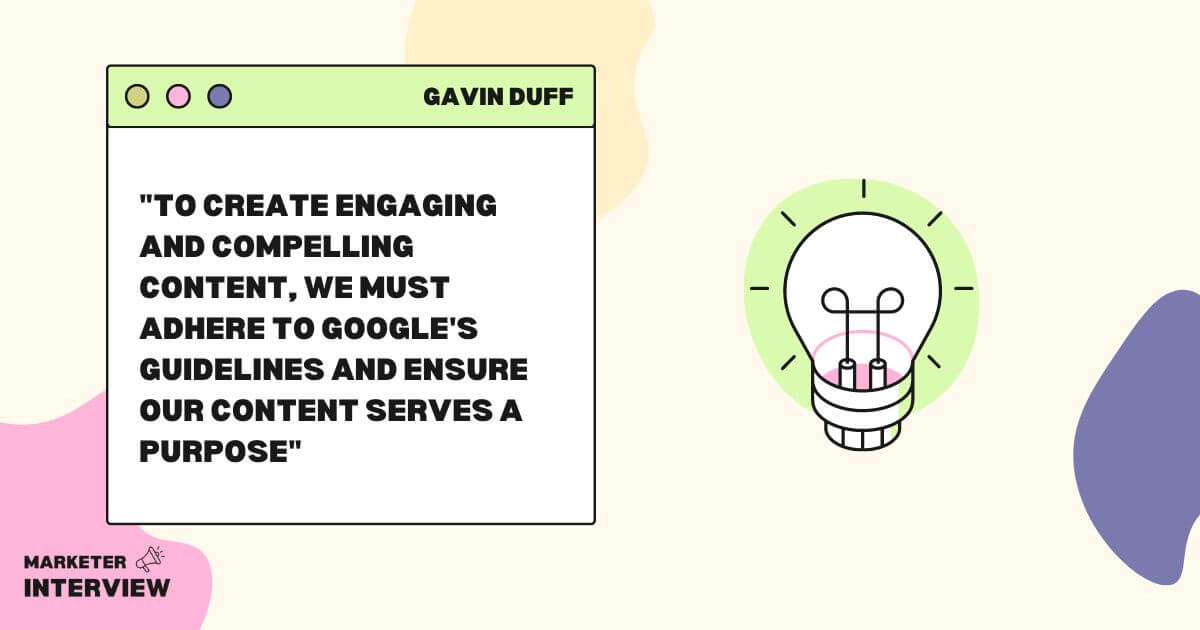
AI (Artificial Intelligence) has made significant advancements in the marketing industry. In what ways will marketers need to leverage AI technologies to enhance marketing campaigns or optimize performance?
AI has genuinely revolutionized the marketing industry, and it has more to do. It has been present in tools and platforms we’ve used for a long time. People just talk more about it now.
Firstly, AI can help with audience segmentation. By using advanced algorithms, marketers can analyze loads of data to uncover their target audiences’ patterns, preferences, and behaviors. This means they can create highly personalized campaigns that truly resonate with customers.
Another great application is predictive analytics. AI can crunch historical data and consumer behavior to predict the future. This helps marketers forecast customer preferences, spot trends, and adjust their strategies. It’s like having a crystal ball to make smarter decisions.
AI also plays a significant role in content creation and personalization. Thanks to natural language processing algorithms, it’s like having an AI-powered writer’s block tool right there.
Automation is another area where AI shines. Marketers can automate repetitive tasks such as data analysis, reporting, and campaign optimization – only to the point where it requires human input. This can free up their time to focus on strategic or creative initiatives. Being strategic or creative are two things that AI has undoubtedly not mastered.
AI can also be a great ally in optimizing the customer journey. By analyzing customer touchpoints and interactions, marketers can identify areas for improvement and deliver personalized content at each stage. This makes the customer experience more seamless.
When it comes to ad targeting, AI is a game-changer. Marketers can leverage AI algorithms to analyze customer data, browsing behavior, and demographics. This allows them to deliver highly targeted and relevant ads to the right audience at the right time and through the most effective channels.
Lastly, AI can help with sales and revenue forecasting. Marketers can get a sense of what’s coming down the pipeline by analyzing sales data, market trends, and external factors. This enables them to make informed decisions about budget allocation, resource planning, and campaign optimization.
Again, I must stress that human input is required at every stage.
Cyberpsychology is a fascinating area of interest for you. How do you approach understanding the psychological aspects of consumer behavior in the digital realm?
Cyberpsychology is the study of the interaction between humans and computer technology, so, of course, it can play a significant role in shaping our digital marketing strategies. By leveraging it, we can gain insights into what resonates with our audience and tailor our marketing approaches accordingly.
One crucial aspect of cyberpsychology to consider is the visual design of websites.
Colors and fonts have psychological implications and can influence how your audience perceives your brand and offering. Research shows that color combinations can evoke certain emotions and impact customer opinions.
For example, red can create excitement and drive action, while black can convey seriousness and professionalism. Fonts also carry psychological implications, with italics and script fonts often associated with creativity, innovation, and warmth. I’m generalizing a bit here for examples, of course.
In addition to visual elements, the language we use in our marketing messages holds significance. The choice of words can shape customers’ perceptions and impressions of your business. For instance, warmer phrases like “we promise” fosters trust, while words like “coupons” may trigger negative associations. Crafting our messaging carefully allows us to create the desired image and resonate with our target audience.
Strategic placement of call-to-action buttons is another consideration in cyberpsychology-driven marketing. Studies have shown that positioning buttons at the bottom right corner, just above the fold, yields the best results. Most of us know this, but that’s cyberpsychology.
The checkout experience is another critical stage where cyberpsychology can optimize conversions. We can design an intuitive and trustworthy process by understanding the cognitive steps involved in providing shipping information, billing information, and finalizing orders. Aligning the checkout flow with human cognitive patterns minimizes cognitive load and enhances the user experience.
Moreover, cyberpsychology can be leveraged to create a more humane digital environment. Recognizing the addictive and distracting nature of the internet, cyberpsychology experts can collaborate with AI and big data technologies to mitigate these issues such as addiction, cyberbullying, and much more. It’s so interesting.
In today’s digital landscape, marketers have access to vast amounts of data that can be harnessed to make informed decisions and optimize their campaigns. By leveraging data analytics, marketers can understand consumer behavior, identify trends, measure campaign performance, and personalize their marketing efforts.
One case that shows the impact of data-driven insights on a campaign’s success – and it’s pretty old – is the “Share a Coke” campaign by Coca-Cola. This campaign aimed to reignite consumer engagement and boost sales by personalizing Coke bottles with individual names.
Data analytics played a pivotal role in identifying the most famous names in different regions, enabling Coca-Cola to customize its product offerings accordingly. By analyzing vast amounts of consumer preferences and purchasing patterns, they created personalized experiences that resonated with their target audience.
The campaign generated a 2% increase in soft drink sales globally, reversing the declining trend the industry was experiencing at the time. The personalized bottles created a sense of novelty and exclusivity, driving consumers to share their experiences on social media, resulting in widespread brand awareness and user-generated content.
Furthermore, data analytics provided real-time feedback on consumer sentiment and engagement. Coca-Cola closely monitored social media conversations and analyzed customer feedback to make real-time adjustments to its marketing strategies. By leveraging data insights, they were able to identify emerging trends, optimize their messaging, and tailor their campaigns to specific market segments. It was very clever.
As a seasoned professional, you must have encountered various tools and software. Which ones have proven to be indispensable for your work?
Regarding digital marketing, I believe in finding reliable tools that work well for me rather than overwhelming myself with numerous options.
While digital marketing tools can be valuable assets, they should be viewed as tools rather than complete solutions. The human element brings the strategy to life and makes a real impact.
While there is no denying the benefits of leveraging tools in shaping marketing strategies, I also place a great deal of value on the role of traditional research methods.
The insights from thorough research can provide a deeper understanding of consumer behavior and market dynamics that no tool can fully replicate. By combining the power of data or AI-led tools and traditional research, marketers can develop well-rounded strategies that resonate with their target audience.
That said, some are, of course, very good. SEMRush is excellent. After years of comparing SEO tools, this one eventually won out.
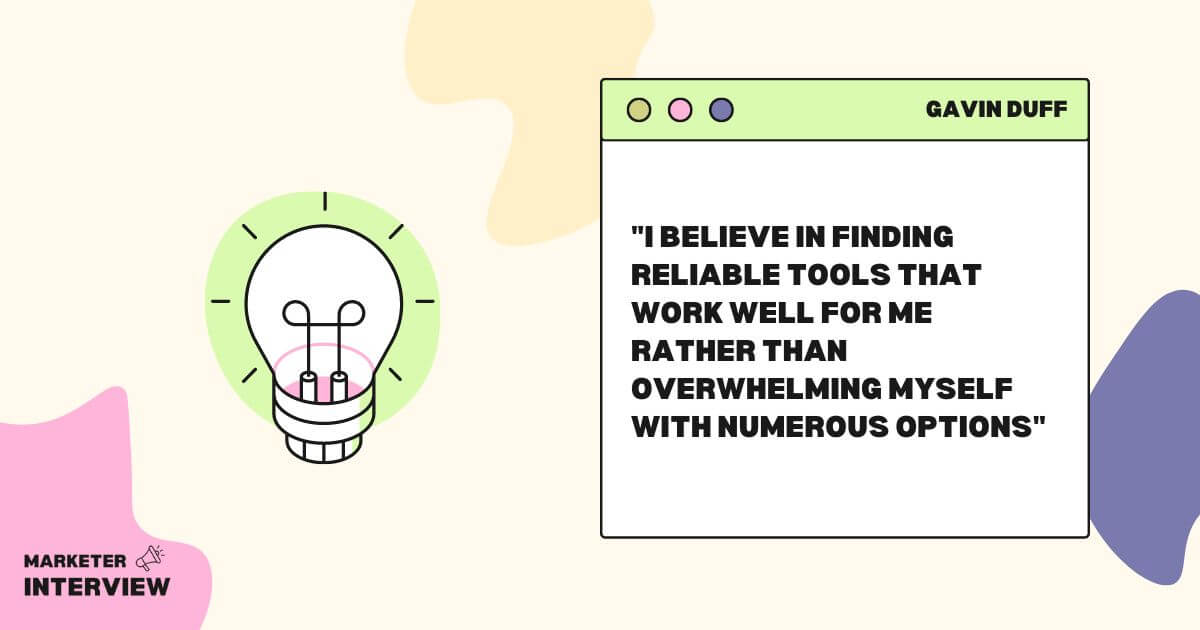
Considering the rapid pace of technological advancements, what future trends in digital marketing do you find most exciting or promising?
Absolutely! When it comes to future trends, there are a few that I find particularly interesting.
One trend that holds great promise is the integration of Artificial Intelligence (AI) and Machine Learning (ML) technologies. These tools have already shown their potential by analyzing vast data, personalizing customer experiences, and automating processes.
We can expect even more advanced AI-powered chatbots, voice assistants, SEO tools, content tools, ad platforms with predictive analytics, and more that will help marketers create highly targeted and personalized strategies.
Another trend that I find fascinating is the rise of Augmented Reality (AR) and Virtual Reality (VR). These immersive technologies have the power to revolutionize how consumers interact with brands. As AR and VR continue to advance, they will become indispensable in marketing campaigns, allowing brands to create engaging experiences for their customers like never before.
Privacy and data protection are also emerging as vital considerations in the future of digital marketing. With increasing privacy and data security concerns, marketers must prioritize transparency, consent, and ethical data usage.
Stricter regulations like GDPR and CCPA have prompted marketers to reevaluate their practices. Building trust with the audience through robust security measures and responsible data handling will be crucial for success. It has made digital marketing less fun, but we must go with it.
